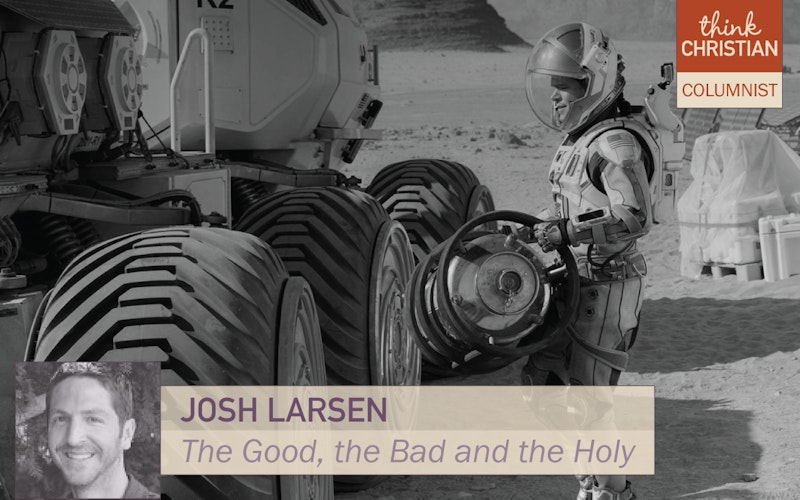
Movies
The practical salvation of The Martian
The Martian is nothing if not practical. As it tells the story of astronaut Mark Watney (Matt Damon), who has been abandoned on Mars, the movie spends little effort wondering “what it all means.” Watney doesn’t waste time pondering life and death or his place in the universe. Rather, as he says, “You can either accept that (death) or you can get to work.”
The Martian watches him work. Upon gaining consciousness after miraculously surviving a massive storm system, his very first act is to cut a wire that is tying him down and march back to his research station. There, he sets about tending to his wounds, taking inventory and eventually figuring out a way to grow potatoes. It’s both comical and a commentary on the movie’s modus operandi that in almost every scene Watney is eating; tending to his physical needs is a top priority.
Watney has plenty of down time, but he doesn’t spend much of it contemplating the existential implications of his predicament. In one early scene he watches an old recording of Happy Days while twirling a crucifix, deep in thought. Will a statement on hope and belief ensue? Nope. When he speaks, he says, “The problem is water.” Director Ridley Scott and screenwriter Drew Goddard have pulled a fast one on us. Just when we think the movie was about to get deep, it returns to the practical.
God knows our eating, our tiredness, our sleeping, our fears, our very deaths.
This emphasis on human action as opposed to reflection would seem to be antithetical to a Christian sense of spirituality. But assuming that would be to forget the Incarnation. We are thinking beings, yes, but we are also acting beings, which is why Christ came to earth as an active body rather than a disembodied spiritual presence. Not for nothing does 1 John 2 instruct us to “walk in the same way in which He walked.”
There are two days on the church calendar that we tend to remember this: Christmas and Good Friday, Christ born and Christ crucified. (The fact that the culture has largely appropriated the first holiday, rather than the second, tells us which picture of Jesus’ is generally preferred.) It’s good to have other reminders of Jesus’ humanity beyond Good Friday and Dec. 25, of course, to keep our image of God from drifting off into the spiritualized ether. As New Testament theologian Richard Bauckham wrote, “Even if we took the most anthropomorphic language of the Old Testament as criterion of what can be said of God, still many statements remain which can only be made of God as the subject of the human life of Jesus: that he eats, gets tired, sleeps, is afraid, dies.”
The upshot? God knows our eating, our tiredness, our sleeping, our fears, our very deaths. And so our bodily struggles deserve the attention that a movie like The Martian gives them. If there’s something “earthy” to the rescue mission of The Martian – if the movie is missing the existential/spiritual resonance of, say, Solaris or 2001: A Space Odyssey - Christians should not be dismissive of it. In an inadvertent way, the movie speaks to the realities we face as embodied creatures, rescued by an embodied God.
Topics: Movies, Culture At Large, Arts & Leisure, Theology & The Church, Theology